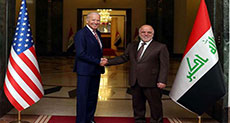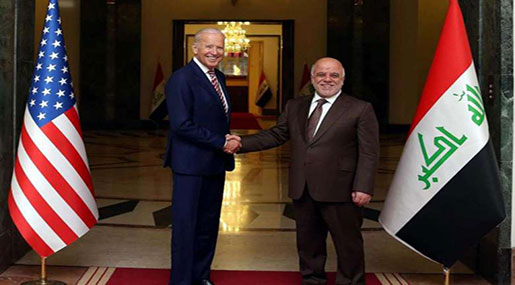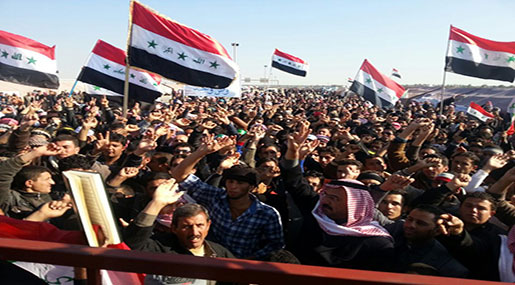
Iraq’s Deepening Political Crisis is Music to Washington’s Ears!

Darko Lazar
US Vice President Joe Biden - aka Washington's ‘point man for Iraq'- is the highest-ranking US official to visit Baghdad since the withdrawal of American troops in 2011.

On an unannounced trip to the Iraqi capital earlier this week, Biden is reportedly working to shore up the government of Prime Minister Haidar al-Abadi and bolster the military campaign against Daesh [Arabic acronym for Takifir "ISIS" / "ISIL"].
But the US Vice President - whose ‘Biden Plan' openly called for the Balkanization of Iraq into Kurdish, Sunni and Shiite regions in 2006 - was likely thrilled to find a country facing a constellation of existential challenges, ranging from the bloody military campaign against the Daesh terror group, to a collapsing economy amid record-low oil prices and a political stalemate that has effectively crippled the government in Baghdad.
These abysmal conditions have given rise to a wave of popular anti-government protests, which have been sweeping Iraq since last summer.
"The Iraqi people have been asking for radical reforms," said the director of Iraqi Democrats Against Occupation, Sabah Jawad.
"People are fed up with the lack of services and the corruption. The corruption touches every corner of the Iraqi state, across the political spectrum; whether it's the presidency, the cabinet, the parliament... even the judiciary is plagued by extensive corruption," Jawad added.
Iraq's prime minister initially responded last year by announcing a reform package that included plans to form a new cabinet, which would hand key portfolios to independent technocrats in a bid to root out patronage and corruption.
But serious objections from key ministers, who stand to lose their political careers under the planned reforms, have proven to be a key hurdle.
The bickering among Iraq's lawmakers led to the latest round of political turmoil, which had grown out of weeks of rallies by followers of influential Shiite cleric Muqtada al-Sadr. The cleric's supporters have besieged Baghdad's Green Zone, where the prime minister's offices are located, demanding that Abadi announce his reform plans and a new ministerial council by the end of the month.
However, it was only this week that the Iraqi parliament approved a partial cabinet reshuffle proposed by the premier. The six ministries include health, labor and social affairs, water resources, electricity, higher education and culture.
Saad Al Muttalibi, who is an MP with Iraq's ruling State of Law Coalition, told me that the announced appointments will do little to ease the political unrest.
"From a public point of view, the demonstrators and the people were expecting a complete change of the cabinet. In addition, a number of political parties are insisting that the change should include all the ministries and officials who are perceived as being part of the problem. So I do not think that a short list of five or six or even seven will be adequate to alleviate the tension in the streets," Al Muttalibi said.

Those tensions have spilled over into the halls of power. On April 14, Iraqi MPs staged a sit-in at the parliament building, voting to dismiss its Sunni Speaker, Salim al-Jabouri, who is perceived by many Iraqis as one of the main obstacles to Abadi's proposed reforms.
"There are question marks regarding some of the people who took action to oust the speaker of parliament. But these people know that what they are doing has popular support. They are implementing what the people are demanding. The people are not only demanding reforms; the people see the political system created by the Americans as inefficient and as one that needs to be changed," said Sabah Jawad.
What's more, unity among Iraq's Shiite parties has also fallen victim to the latest wave of political turmoil, causing a rift between the Islamic Supreme Council of Iraq [ISCI], the Sadersits and the prime minister's Dawa Party.
The existing power-sharing formula introduced after the US invasion in 2003, which ousted the regime of Saddam Hussein, is at the heart of Iraq's political crisis.
According to Jawad, "This situation has been created by the Americans with the creation of this sectarian system of governance, which is based on sectarian divisions. This system is not capable of functioning. In fact this system is the incubator of problems in Iraq."
Today's barely functioning Baghdad government - largely brought on by the ‘Lebanonization' of the country in 2003, and coupled with sectarian tensions and the fight against Daesh - have given rise to fresh calls for Iraq to be partitioned.
A former American official, who served in Baghdad during the US occupation, called Iraq "a violent, dysfunctional marriage" in his recent comments to the New York Times.
And while American officials have said that maintaining Iraq's unity is still their policy, UN officials in Baghdad have quietly begun studying how the international community might manage a breakup of the country.
Speaking to American diplomats and military personnel during his visit to Baghdad earlier this week, the US Vice-President referenced his proposal from 2006.
"All the places we've sent you guys and women. They're places where, because of history, we've drawn artificial lines, creating artificial states made up of totally distinct ethnic, religious, cultural groups," Biden said.
In less than two years, the Americans have managed to reoccupy Iraq by sneaking in close to 5,000 combat troops under the pretext of fighting Daesh, without Baghdad's approval.
The American military presence has helped bolster Kurdish and Sunni aspirations for more independence from Baghdad. The Kurdistan Regional Government, already highly autonomous, found itself enjoying US support in its fight against Daesh, managing to expand its territory by some 40 percent over the last two years.
Meanwhile, the Shiite-led Popular Mobilization Units, which have proven to be the most effective fighting force against Daesh, have been sidelined in parts of Iraq's north and east to make way for Sunni militias that do not answer to Baghdad.
These developments have led to speculation that parts of Iraq are being carved up to serve as American military protectorates, once the Daesh terror group is pushed out.
In an interview with Russia Today [RT], political author and journalist Dan Glazebrook said the powers that formerly colonized the region have always worked to destroy Iraq.
"They have always seen Iraq as a threat because it has the great potential to be a great regional independent power in its own right. It is the only Arab country that really has all four prerequisites for being a strong independent power; it has got a large, sizable population, so it can have a large army, unlike, say, Saudi Arabia; it has got oil resources obviously, unlike, say, Egypt - another big populist Arab country; and it has got plenty of arable land and plenty of water."
Source: al-Ahed News



